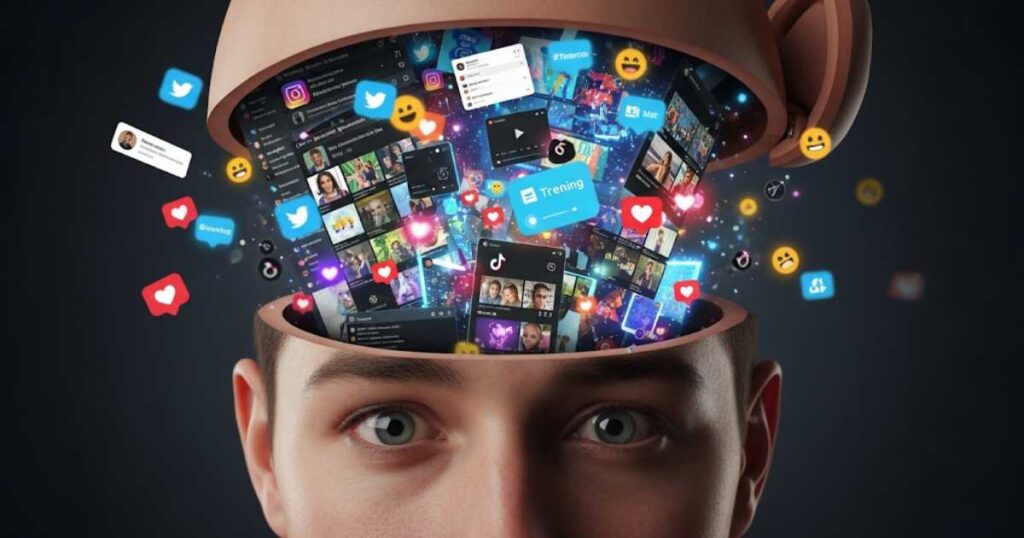In 2014, I ventured into the world of social media, starting with Twitter and soon after, Facebook. At the time, these platforms were not as engaging, or should I say, as addictive as they are now.
If you’re from my generation, you’d likely remember that well. My point here is simple: social media, back then, was far from being the time-consuming vortex it has now become.
I still remember scrolling through my Facebook feed, which would come to an end after 15 to 20 minutes. These days, you can scroll endlessly, hours upon hours, without ever reaching the bottom.
The platform never stops serving content, and we never stop consuming it.
Life before social media felt different. I grew up in Chuinj, a small village nestled in Chitral, Northern Pakistan.
We didn’t have paved roads, luxurious food items, fancy clothes, or top-notch schools. Life revolved around simple things — helping in the fields, attending school, and aiming to do well in class.
My primary concern back then was to top the class, which was easy since there wasn’t much competition. Despite what may seem like limitations, I never felt deprived. In fact, life felt good, fulfilling even.
Fast forward to now, I live in a city, hold a university degree, have access to better food, wear nicer clothes, and my standard of living has undeniably improved. But here’s the catch — I don’t feel as content as I did back in the village.
The simplicity, the lack of constant pressure, and the absence of comparison made my earlier life feel much more peaceful. So why is it that even with all these improvements, I don’t feel as happy?
I’m sure I’m not alone in this feeling. It’s a common dilemma of our time. We have more than we ever dreamed of, yet many of us feel emptier than before. And I believe I’ve found the reason: social media.
Social media has a unique ability to distort reality. It makes you believe that everyone else is living a perfect life while you are left struggling. And why is that? It’s the culture of comparison.
Think about it. When you scroll through social media, what do you see? You see people showcasing the best parts of their lives: the new car, the beautiful house, the perfect vacation, the picture-perfect relationship.
But what you don’t see are the messy realities behind those pictures — the struggles, the arguments, the setbacks. People only post the highlight reel of their lives, carefully curating their images to appear flawless.
I’ve been guilty of this myself. Just recently, I came across a post on Instagram featuring someone sporting an expensive pair of shoes. Even though I already own more shoes than I can wear, I felt the urge to buy them.
Why?
Not because I needed them, but because I wanted to fit in, to have something that looked impressive to others. That’s the power of social media — it creates desires that didn’t exist before.
This cycle is relentless. We see influencers living seemingly perfect lives, and we convince ourselves that we need to mirror that. We start believing that in order to be happy, we need to have what we have — the perfect body, the trendiest clothes, and the most luxurious vacations.
But this version of life is an illusion. It’s a façade, and behind it lies a reality that’s much more complex, and far less perfect.
A perfect example is celebrity couples. They post beautiful, romantic photos online, making it seem like they have the perfect relationship. Yet, time and time again, we hear about their breakups.
This just shows that what we see online is only one side of the story, a carefully crafted narrative meant to project happiness and success.
Social media, in many ways, has warped our perceptions of happiness. We’ve tied our sense of worth to the number of likes and comments we receive.
Imagine if 20 people complimented you in person, telling you how great you look — you’d feel amazing. But when those same compliments appear under a photo on social media, they don’t carry the same weight. You’d still want more — 200 comments at least, because 20 doesn’t feel like enough.
It’s a never-ending chase. We’re constantly seeking validation, always comparing ourselves to others, and always feeling like we’re falling short.
So what’s the solution? I’m not saying we should uninstall social media completely. It has its positive aspects too. But we need to regain control. We need to stop mindlessly scrolling and consuming content that does nothing but make us feel inferior.
We need to remember that life isn’t about impressing others with posts of fancy meals, expensive clothes, or glamorous vacations. It’s about finding joy in our own imperfect lives, in the things that truly matter.
Try this as an experiment — uninstall your social media apps for a few days. You’ll realize that you don’t need that new pair of shoes or the perfect body. You’ll see that you don’t need to impress strangers online.
Instead, you’ll focus on the people who really matter — your family, your friends, your partner. You’ll begin to appreciate the real connections in your life, and you’ll find happiness in being yourself, imperfections and all.
In the end, life isn’t about following trends or chasing an illusion of perfection. It’s about living authentically, focusing on what truly makes you happy, and refusing to let social media dictate your self-worth.



